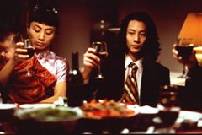|
|
||||
|
|
by Donald Levit  A chick-flick is one thing, especially one that concerns two growing social problems and touches an unusual racial-ethnic chord. A not very good movie is quite another. It does not help Face that John Inwood’s photography makes everything look like an extension of the red-blue disco-club where teens meet and fall in love, nor that costumer Sarah J. Holden envisions everyone so immaculate that '90s young folks sit on fire escapes in jeans and shirts just out of the box. Or that Chinatown-English accents ring false and, in one case, sound even more untrue after nineteen years in New York’s Queens, or that the same “52 St-Lincoln Av” subway sign so heavy-handedly underlines similarity of situation two decades apart. This independent film bore up better in its original short form as Bertha Bay-Sa Pan’s prized 1997 graduate film school thesis but, directed, co-written and co-produced by that young New Jerseyite, is too slight in realization and trite in characterization to work as it might have. Slender and stunning in all black and dark sunglasses -- only once does she change, to sharkskin blue, for a climactic confrontation -- Kim (Bai Ling, who fled China after Tiananmen Square) is on a plane descending to land in New York (and will ascend on an open-ended outward journey at the conclusion). A business trip for her bank in As a limousine carries her to a hotel, she reflects, and it is now Brought up by grandma and now nineteen, daughter Genie (Kristy Wu) loves the woman who raised her, hardly speaks the language of her forebears, works part-time, wears short tank tops, drinks a bit and dances in discos; she also secretly spies on the suburban house of her remarried father and dislikes the mother she has seldom seen but with whom she shares a strawberry ice cream craving. At a club, she attracts tattooed nice-guy African-American deejay Michael (Treach, of hip-hop group Naughty by Nature). Grandma speaks to and honors the photo of deceased Grandpa and objects to Genie’s dating outside the community. Taught by his mother to be “a gentleman,” solid Michael “didn’t know that much about your world, I just wanted to know you.” Seeing herself in her daughter, and painfully seeking to mend fences with her mother Liu and with Genie, Kim must decide on a job transfer either back to Concerning generally unbroached issues of cultural racism among non-whites, and of “abandoned” children and mother-love and sacrifice, Face could have been a heavy movie. That it's not doesn't necessarily earn the film a demerit, but its thinly glossy treatment of theme and character does. (Released by Indican Pictures; not rated by MPAA.) |
||
|
© 2026 - ReelTalk Movie Reviews Website designed by Dot Pitch Studios, LLC |



